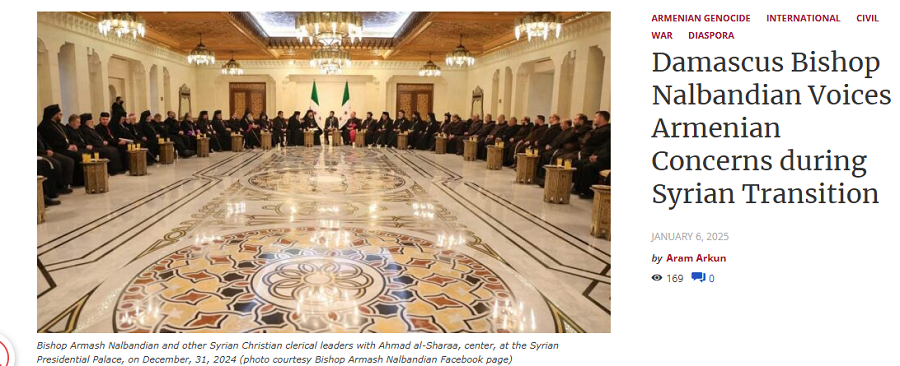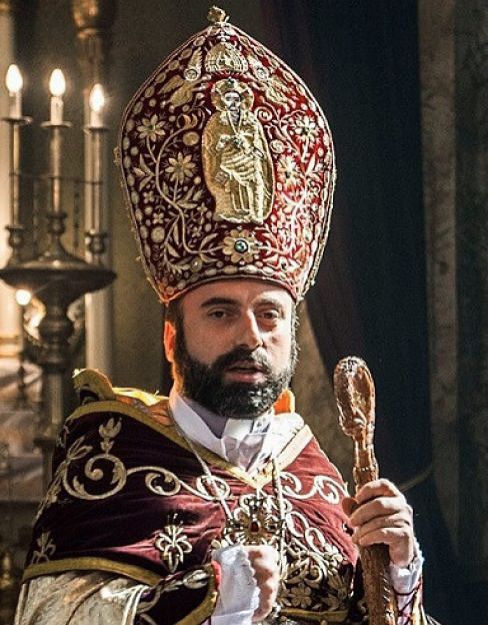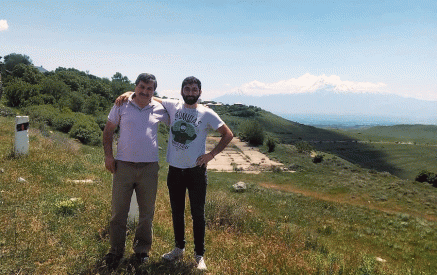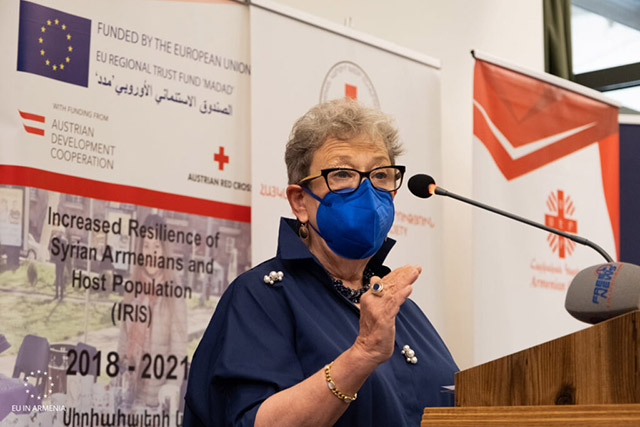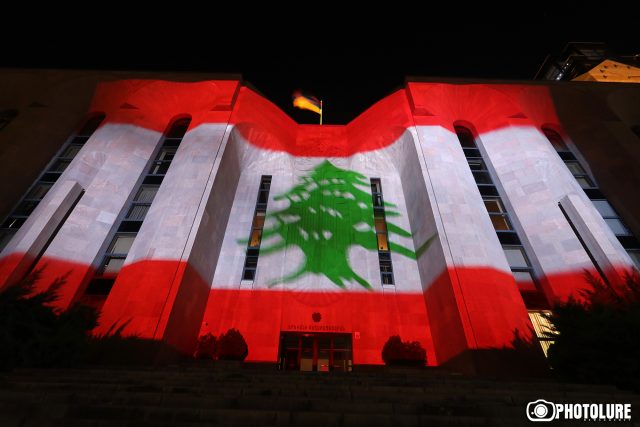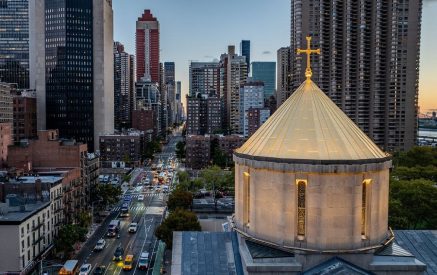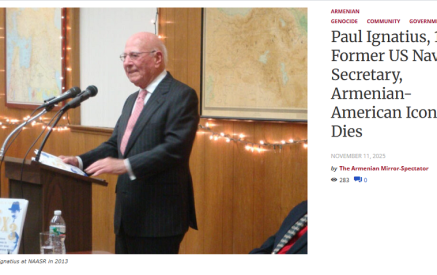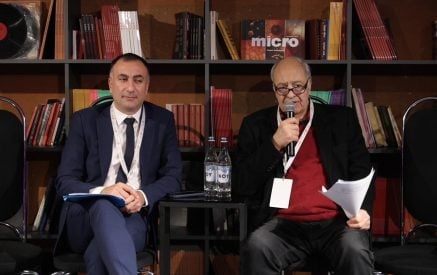The Armenian Mirror-Spectator. WATERTOWN — Syrian Armenians and other Christians face a situation of uncertainty after the Sunni Islamist organization Hayat Tahrir al-Sham (HTS; Organization for the Liberation of the Levant) overthrew the Assad regime and took control of Damascus on December 8 last year. Bishop Armash Nalbandian, the Primate of the Armenian Diocese of Damascus, has been a prominent voice for local Armenians, meeting with HTS officials and giving interviews to prominent German, British, Turkish, Armenian and other international media outlets over the last few weeks about the changes taking place. He gave an interview on January 3 to the Mirror-Spectator.
Bishop Nalbandian is a native of Aleppo who went to Armenia to study at the Gevorkian Theological Seminary. Afterwards, he served as a pastor to the Armenian community in Germany but he returned to Syria in 2004, where he was elected as Primate in Damascus.
Armenians have lived in Syria for several millennia, but a majority of the current community is formed of descendants of survivors of the Armenian Genocide. Civil war in Syria from 2011 until 2019, followed by Covid, and poor economic conditions, led to the shrinking of the community, from a peak of 80-100,000 to what many estimate as low as 20,000 currently, with many emigrating to Armenia, the United States, Europe, Australia and elsewhere.
In Damascus, Nalbandian said that based on the numbers of school children in Armenian schools and the registered visits of priests to homes for blessing ceremonies, there are at present around 750 Armenian families and a community of around 2,500-3,000.
Read also
After the collapse of the Assad regime, some Syrian Armenians left their homes, with many going to the Syrian coastal regions, like Latakia, or Beirut, Lebanon. When they saw that the situation in Aleppo and Damascus did not appear dangerous, they returned. Nalbandian concluded, “I would say there is not a huge [new] wave of emigration of Armenians from Syria so far.”
Crackdown on Assad Regime’s Supporters
There appear to be at least four general areas of concern for Syrian Armenians. First, the new government says that it wants to obtain reparations and bring to justice those whose hands are bloody from the past regime. Nalbandian said that many members of HTS say that Christians, including Armenians, backed the Assad regime, though the new government officially does not say this. In response, he said, “It is not so that we backed the Assad regime. It was that everyone had to live with the Assad regime. I can speak for myself. I have a school and I have to cooperate with the Ministry of Education. I have houses, apartments and other properties. I have to work with the mayor and the city of Damascus. We have also a spiritual court (Ազգային Դատաստանական Խորհուրդ) so I have to work with the Ministry of Justice.”
In other words, for most people to conduct their daily lives and survive, they had to deal with the government but that did not imply backing the regime. For example, Armenians worked in the city, in social services or the infrastructure system, he said, like others.
Moreover, he said that when something happened to Armenian community members during that period, he and others who were in a position to intervene and ask for justice had to struggle for this purpose.
Strong Turkish Influence
Armenians are made uneasy by the Turkish connection to HTS. Nalbandian gave three examples from the past as background which bear this out. First, when opposition terrorist groups attacked Aleppo during the earlier civil war, the damage to Christian and Armenian districts and streets evidenced the intention of the larger regional player, Turkey. Second, when Kessab, the Armenian village in northwestern Syria, was occupied in 2014, the al-Nusra terrorists invaded it from the nearby Turkish border. He said, “You can now count one plus one is two to understand this.”
The third example is the destruction of the Armenian Genocide Martyrs Memorial Church in Der Zor in 2015 by fighters of the Islamic State. Nalbandian noted: “The location of this chapel is not important for the military, strategically. It is just in the street, and there is not a huge meaning just to occupy this place. When they came and bombed and desecrated this monument, we can read what is behind it. In my humble opinion, I can say that…they tried to hurt our feelings and our soul as Armenians here, because the Armenians in Syria are mainly survivors of the genocide of the second, third, and fourth generations.”
Turning to recent events, Nalbandian said that it is telling that the first foreign embassy that opened in Damascus was the Turkish one. On December 12, only a few days after the collapse of the Assad regime, the chief of the Turkish Intelligence Service (Milli Istihbarat Teşkilat), İbrahim Kalın, came to meet with the new leaders of the government and prayed in the famous Umayyad Mosque in Damascus. A bit later, on December 22, Turkish Foreign Minister Hakan Fidan’s visit to Damascus with a heartfelt welcome from al-Sharaa. These are all indicators of Turkish influence and importance for the new regime.
Additionally, in the first few days after the collapse of the Assad regime in Aleppo, you could buy anything in Syrian lira, US dollars or Turkish lira. Nalbandian said that while Syrian lira is the official currency of the country, and the use of dollars as a globally accepted currency is understandable, the use of Turkish currency shows the economic and political importance of Turkey in the area.
Post Revolution Era
There is still a great deal of disorganization in Syria in this transitional period. During the earlier civil war period, Nalbandian related that the Assad government gave weapons to young men as part of a sanctioned defense effort to control who entered the Armenian and Christian districts and defend the houses and properties of Armenians and Christians there. Such defense forces, which were not organized specifically as Armenian or Christian but on a district basis, do not exist anymore, he said.
However, Nalbandian pointed out that after the collapse of the Assad regime, police do not exist in parts of Syria and there is no official army presence. He said, “This new government is facing huge problems to organize infrastructure services to keep the cities secure and stable.” He said that where some kind of policemen are present, the local population offered to help them to keep order in these districts. Armenians too continue to patrol in some densely Armenian-populated areas.
“We had this experience, but I don’t think this will last long. After this new government establishes services of order, they will seize all weapons from the people,” Nalbandian declared.
In general, Nalbandian said, “Life is moving towards normalization. Schools restarted working by December 15 or 16, after some 10 days of closure. Now there is vacation until after Christmas on January 7. Everyone started going to their places of work. But when dark falls, people prefer not to go out and stay home. It is nothing dangerous, but we have to be very cautious.”
In the big cities, things appear fairly calm but in many other places, Nalbandian said that thieves were profiting from the unstable situation. Also, some people use the opportunity to take revenge or settle accounts with people they had issues with.
There also have been some incidents specifically targeting Christians, including Armenians. For example, he said that in the central city of Hama, 14-15-year-old teenagers shot the wall of the Greek Orthodox Church. Everyone has a Kalashnikov or some kind of weapon at present, Nalbandian noted. The teenagers also entered the Christian cemetery and damaged a few tombstones. However, a local pastor or people called the police, who came and captured the perpetrators, who apologized.
Similarly, when a Christmas tree was set on fire in al-Suqaylabiyah, near Hama, the police captured the young people who did it in a few hours and promised to restore the tree.
Nalbandian said, “I am not afraid of the thieves and the burning of the Christmas tree. I think that it is normal in this unstable situation. Robberies and casualties also happen everywhere in the world. I would be afraid, however, if the police would not be able to control it and restore order and security to the region.”
In the meanwhile, he said that Armenian community leaders and others are asking the authorities to take action to minimize these incidents.
Theocracy or Democracy?
Perhaps the most troubling uncertainty is whether the new Syrian state will be a democracy or be ruled through Islamic law as a theocracy, in which Christians would be second-class citizens. HTS started out as a promoter of the latter. It was formerly known as al-Nusra Front after working with the Islamic State (ISIS) around 2011-12, became affiliated with al-Qaeda. It started out as a jihadist offshoot of the Islamic State (ISIS) around 2011-12, became affiliated with al-Qaeda the following year, but by 2016 split from it. In 2017 through the merger of several armed factions HTS was formed, and it came to control Idlib Province, in northwestern Syria, where it created the Syrian Salvation Government.
HTS was designated as a terrorist organization by the UN, the US, the EU and the UK. In fact, in 2017 the US State Department offered a $10 million reward for information leading to the capture of its leader, Ahmed al-Sharaa (formerly known as Abu Mohammed al-Jolani). This offer was only rescinded in December 2024 and HTS is trying to portray itself as more moderate. It has disavowed international terrorism.
How Syria will be governed after the current transitional regime ends on March 1 is still to be determined. Nalbandian said, “We are very worried. We are very concerned about the situation because we don’t know what is happening and we don’t know what will happen. Even this new government doesn’t know how it will rule all Syria as a government and in which direction it will have to go. We Christians, but also Armenians, are just following day by day or even hour by hour because changes are happening so quickly.”
One problem is the lack of verifiable official statements of the position of the government. Nalbandian said, “We don’t have any official portal so that we can say this is the official announcement of the government. Everything we hear, the information that we get, is on a Facebook basis. And you know that Facebook is 100 percent true, and 100 percent not true. I will not say 50-50 to just not give the credit to Facebook.”
While Nalbandian said that the background of the people coming into power is well known, they have made promises for democracy. At the same time, many representatives from the US, Europe and elsewhere are coming to meet with them and they stress the principle of preserving the rights of the religious and ethnic minorities. Many of the Christian clerics, including Bishop Nalbandian, are giving interviews to foreign media and underlining the importance of the latter. “With the pressure of the international community,” he said, “we have a huge hope that this government will consider when it is going to write the new constitution to include these rights in it.”
Meeting with the New Leaders
On December 11, 2024, a meeting of 40 Christian clerical leaders of Damascus, including Bishop Armash Nalbandian, with Bashir Ali, director of the new government’s Department for Religious Communities, took place at the latter’s request at the Latin Church of Damascus to discuss issues concerning these communities. Nalbandian said, “We talked with him and stated all our concerns and demands. It was before Christmas, so [we asked] how Christmas will be? Will it be safe? Will the government be able to have everything under control. Will our lives be safe?”
The answer was that everything will be good and safe, and a new Syria was being created. Nalbandian said, “We got very huge and beautiful promises. At the end we said this is okay, but now we need time to see all these promises happening in reality.”
Several weeks later, the main leader of HTS, Ahmed al-Sharaa, invited a delegation from the heads of the Christian churches in Syria to meet with him at the presidential palace. This December 31, 2024, meeting only lasted around half an hour or less, Nalbandian said. The Christian clerics reiterated their concerns and underlined the importance of the rewriting of the constitution. They said they wish to be very active and involved in this process in order not only to defend their own rights but those of every citizen of Syria.
Nalbandian said that they also declared that they didn’t consider themselves minorities because Christians were in Syria before Islam. As an important component of Syrian society, they have to be present both in the writing of the constitution but also in the government building, perhaps with one or two seats in the cabinet, as ministers.
They also asked about rumors of an upcoming national dialogue conference, and whether if it takes place, the clerical representatives will also be invited. They asked what role or position they would have in such a discussion or negotiation. Al-Sharaa replied that he came to Damascus and now everyone is free and no longer under pressure as during the Assad regime.
Al-Sharaa said that they don’t consider anyone minorities, and everyone was equal, so that they want the law to endow everyone with the same rights. He mentioned that out of 20 of his friends, 10 are Christians, including Armenians. Nalbandian said “He was just giving us the feeling that he is for this mosaic picture of Syria. But about our presence and this conference of national dialogue, he said nothing and then finished the meeting.”
At the end they took pictures and wished everyone a happy new year and that was that, said Nalbandian.
Nalbandian concluded, “I will not speak on behalf of anyone, but I feel that there will be some Islamic coloring in all this, and maybe also Islamistic (meaning extremist) coloring. Islamic is okay. We will accept this because the majority are Muslims, but Islamistic means more extremism.”
Aid for Syrian Armenians
The Armenian community’s religious leadership is active on two levels, Nalbandian said: “The first is to be in touch with these new rulers, to follow [developments], and if we see something, raise our voice that it is not right…On the other hand, we are working with our members, and families, offering them humanitarian aid. We are giving food baskets or money for them to survive until we see what will happen.”
There are two dioceses of the Armenian Church in Syria. The Diocese of Damascus includes as part of its jurisdiction the cities of Homs, Hama, and the southern part of the country, and is under the jurisdiction of the Catholicosate of All Armenians, headquartered in Echmiadzin, Armenia. The Prelacy of Aleppo, unlike that of Damascus, is under the jurisdiction of the Catholicosate of the Great House of Cilicia, headquartered in Antelias, Lebanon. It includes in addition to Aleppo, the coastal areas such as Latakia, Kessab, and the Jazira region,with Der Zor, Qamashli and Hasaka.
Despite these different jurisdictions, during the Syrian civil war, an emergency Armenian relief organization (Suriahayutean Shdab Oknutean yev Verakanknumi Marmin) was created to unite aid efforts for Syrian Armenians in all areas. There was also a sister organization created in Los Angeles, the Syrian Armenian Relief Fund (SARF), but after the end of that war, sometime in 2018 or 2019, both organizations ended their services.
With the new challenges facing Syrian Armenians, while many have begun to go to their shops and workplaces, there is no business or real work. Therefore Bishop Nalbandian said that each diocese began to help its population from its own resources. For example, a week ago he said the diocese helped 200 families in Damascus with money, and then 100 families in Homs. It is helping people to survive on a monthly basis until the situation becomes clearer in a few months. The Aleppo prelacy is helping its population in the same way.
Nalbandian said that there is some financial support for his diocese from Echmiadzin and some Syrian Armenians from Damascus who now are working abroad make some modest donations. Moreover, he has asked sister Armenian dioceses in the US, Europe and elsewhere to raise money if they can.
If Armenians in the US wish to help, Bishop Nalbandian said that donations can be made through Armenian diocesan or prelacy headquarters. As Syrian banks have no links to international banks, direct transfer is not possible. The Eastern or Western Diocese in the US can transfer money to Echmiadzin and from there, this money will be brought as cash to Damascus. Money could also be directly transferred to Echmiadzin bank accounts.
Nalbandian noted that the Tekeyan Cultural Association chapter in Damascus is very active and organizes lectures, discussions, gatherings, musical events, Christmas bazaars and other activities. Its members serve on the Diocesan Council and are involved in the work of the diocese.



















































